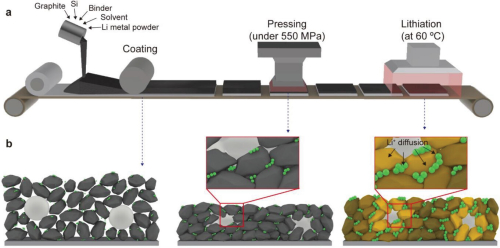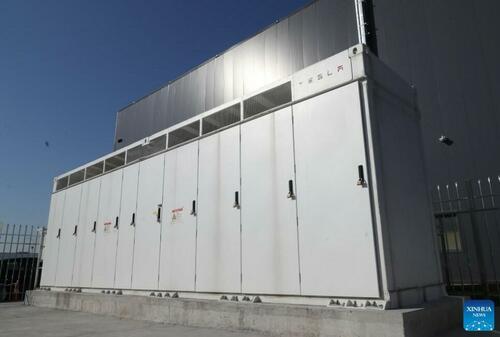Energy & Critical Metals
DGIST-ETRI team uses prelithiation of graphite-silicon electrode for high-performance all-solid-state battery
A joint research team from South Korea’s Daegu Gyeongbuk Institute of Science and Technology (DGIST) and the Electronics and Telecommunications Research…

A joint research team from South Korea’s Daegu Gyeongbuk Institute of Science and Technology (DGIST) and the Electronics and Telecommunications Research Institute (ETRI) developed a dry pre-lithiation strategy for the graphite/silicon-based diffusion-dependent electrodes (DDEs) by simply introducing Li metal powder in DDE.
The added Li metal powder uniformly and continuously provides Li ions to active materials and mitigates the volume change of DDE during charge/discharge cycles, leading to high-performance all-solid-state battery electrodes with excellent stability. Their open-access study is published in the journal Advanced Energy Materials.
Schematic illustrations of a) the PL-DDE fabrication process, including the slurry coating, pressing, and dry pre-lithiation process, and b) the structural and lithiation state changes in each fabrication step. Lee et al.
Existing all-solid-state battery electrodes have a complicated composition, and are limited in terms of energy density. The DGIST-ETRI joint research team developed a new type of electrode where ions are delivered by diffusing them between active materials rather than through electrolyte. Electrodes with such a structure are mostly composed of active materials, thus exhibiting advantages with respect to energy density per volume and mass.
However, silicon has low initial charging-discharging efficiency, which causes loss and reduced capacity of the lithium. To address this problem, the DGIST-ETRI joint research team applied prelithiation to graphite-silicon-diffusion-based electrodes. This technology involves inserting lithium into active materials in advance to supplement the capacity loss during initial charging. Accordingly, the electrode life can be improved as the volume expansion is lessened and the initial capacity reduction of silicon is mitigated.
It has been challenging to apply the prelithiation technology to all-solid-state battery electrodes because it was developed for lithium-ion batteries based on liquid electrolytes. The newly developed technology overcomes this by supplying lithium by uniformly dispersing micro lithium particles into diffusion-based electrodes. Micro lithium particles come into contact with graphite and silicon when making all-solid-state batteries, which spontaneously charges the lithium. An advantage of this approach is its simplicity.
The graphite-silicon-diffusion-based electrodes to which the new prelithiation technology was applied demonstrated higher initial charging-discharging efficiency and improved electrochemical properties compared to conventional electrodes. In addition, volume expansion, which occurs during electrode lithiation, was reduced by nearly 40%, thus improving electrode life.
Resources
-
Lee, J., Jin, D., Kim, J.Y., Roh, Y., Lee, H., Kang, S.H., Choi, J., Jo, T., Lee, Y.-G. and Lee, Y.M. (2023), “Dry Pre-Lithiation for Graphite-Silicon Diffusion-Dependent Electrode for All-Solid-State Battery” Adv. Energy Mater., 13: 2370111. doi: 10.1002/aenm.202300172

Uranium Exploration Company Announces Additional Staking in the Athabasca Basin
Source: Streetwise Reports 12/22/2023
Skyharbour Resources Ltd. announced an update from its Canada-based Falcon Project along with additional…
Tesla Launches New Mega Factory Project In Shanghai, Designed To Manufacture 10,000 Megapacks Per Year
Tesla Launches New Mega Factory Project In Shanghai, Designed To Manufacture 10,000 Megapacks Per Year
Tesla has launched a new mega factory…
Giving thanks and taking stock after “a remarkable year”
An end-of-year thank you to our readers, industry colleagues and advertisers before Electric Autonomy breaks from publishing until Jan. 2
The post Giving…











